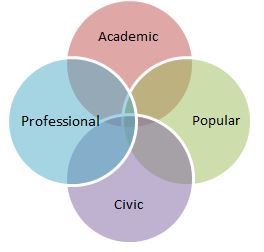Overview
Texts are part of ecosystems, and those ecosystems circulate within and outside in larger ecologies. Four text ecosystems are Academic, Civic, Professional, and Popular. Academic writing is written for teachers, scholars, and students. Civic writing is meant for the public good, for politics, for informing the populace. Professional writing is writing written and shared in workplace settings. Popular writing is designed for an audience, to inform, report, or entertain. You will noticed in the Venn diagram below that there is overlap. An Academic study might get picked up and revised for a newspaper, moving it to the Popular ecosystem, and then a state representative might read it in the paper and work to create a policy brief around the topic, moving it to a Civic ecosystem. Throughout this process, there has been correspondence, emails, and shared notes about the article that are part of the realm of Professional writing.

Writing gets transformed for different ecosystems all of the time, and revising is one of the most important writing skills you can practice. For one, revision allows us to increase the use-value of our writing for our audience. An academic study, maybe read by 100 scholars in the field can be revised for an audience at the New York Times and reach 3 million. Second, deliberate practice increases our mastery of a skill, in this case writing—part of that practice is trying to think through a bit of writing from different perspectives, for different audiences, and for different purposes.
Your Task
Select one of the pieces you have written at DU and revise it for a new rhetorical situation.
- Select the piece from your archive to revise. It can be any piece, for any assignment. It can be a fiction piece or a nonfiction piece.
- Decide how you want to transform it. It needs to be a substantial transformation that crosses ecosystems and/or is in a different genre.
- Find a representative genre that you want to emulate. If you are changing an essay into an editorial for the Denver Post, then read a couple editorials in the Denver Post. If you are turning a lab report into a feature article for Salon, then read some feature articles on Salon.
- Write a Rhetorical Genre Analysis (RGA) (<400 words) before you draft your revision, and it should be uploaded to the blog. The best RGA would offer evidence (quotes) from the article for some of these criteria. Your RGA should do the following:
- Name the genre you want to emulate
- Describe the overall typical organizational pattern of the genre
- Describe how sources and evidence are integrated
- Describe the formality.
- Describe an audience profile of the genre (who would typically read this genre?)
- Describe any other features or style of the genre.
- Draft your revision. This is a draft. It doesn’t have to be perfect, but it should have a structure and words.
- I will offer feedback on your draft during Module 7. This draft is due Wednesday, May 11.
- You will then revise this Revision based on the feedback of your peers to be included in your portfolio (we will grade the final version as it appears in your portfolio).